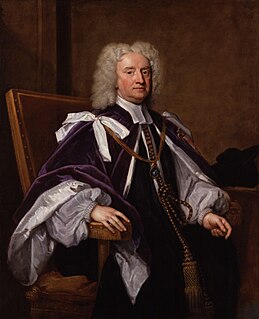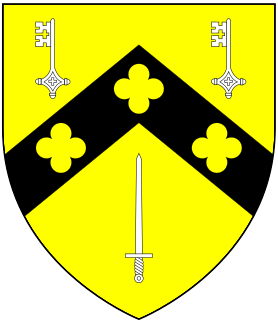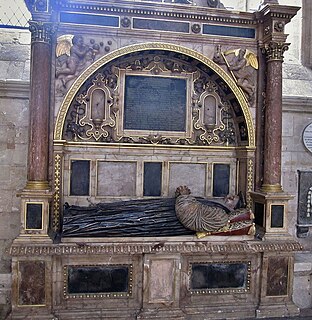Related Research Articles

Hugh Oldham was a Bishop of Exeter and a notable patron of education. Born in Lancashire to a family of minor gentry, he probably attended both Oxford and Cambridge universities, following which he was a clerk at Durham, then a rector in Cornwall before being employed by Lady Margaret Beaufort, rising to be the chancellor of her household by 1503. During this time he was preferred with many religious posts all over the country, being made archdeacon of Exeter in 1502 and finally bishop of that city in 1505, a decision that was probably influenced by Lady Margaret.

Sir Jonathan Trelawny, 3rd Baronet was a British Bishop of Bristol, Bishop of Exeter and Bishop of Winchester. Trelawny is best known for his role in the events leading up to the Glorious Revolution which are sometimes believed to be referenced in the Cornish anthem The Song of the Western Men.

The Bishop of Exeter is the Ordinary of the Church of England Diocese of Exeter in the Province of Canterbury. The current incumbent, since 30 April 2014, is Robert Atwell. The incumbent signs his name as his Christian name or forename followed by Exon., abbreviated from the Latin Episcopus Exoniensis.

Walter Branscombe was Bishop of Exeter from 1258 to 1280.

Alfred Earle was the Bishop of Marlborough from 1888 to his death.

William Cotton was Bishop of Exeter, in Devon, from 1598 to his death in 1621.
The Archdeacon of Exeter is a senior ecclesiastical officer of the Diocese of Exeter in the Church of England. The modern diocese is divided into four archdeaconries: the archdeacon of Exeter supervises clergy and buildings within the area of the Archdeaconry of Exeter.
William Tooker was an English churchman and theological writer, who was archdeacon of Barnstaple and later dean of Lichfield.
Robert Burscough was an English divine.

Reverend William Helyar, Doctor of Divinity, of Coker Court, East Coker, in Somerset, was Archdeacon of Barnstaple and a chaplain to Queen Elizabeth I.
Thomas de Bodham was Archdeacon of Totnes during 1285. In 1284 Henry de Bollegh, Archdeacon of Cornwall, leased to Bodham his own tenement on St John's Hospital in Exeter.
Richard Sydnor was the Receiver and Steward of Bishop Oldham of Exeter Cathedral from 10 Henry VII (1505) to 5 Henry VIII (1514) - see Exeter Cathedral MS. 3690.

Oliver Whiddon was Archdeacon of Totnes between 1568 and 1580.
Lewis Swete was the Archdeacon of Totnes during 1583.
Jasper Swift was the archdeacon of Cornwall and Archdeacon of Totnes.
Edward Cotton was the Archdeacon of Totnes from 1622.
George Snell was the Archdeacon of Totnes.
Nicholas Kendall was the Archdeacon of Totnes, England from 1713 until 1739.
Thomas Skynner, DD was the Archdeacon of Totnes from 1772 until 1775.
Edward William Whately was an Irish Anglican priest: Archdeacon of Glendalough from 1858 to 1862; and Chancellor of St Patrick's Cathedral, Dublin from 1862 to 1872.
References
- ↑ Some Account of the Barony and Town of Okehampton: Its antiquities and institutions. Bridges, W. B; Wright, W. H. K.; Rattenbury, J.; Shebbeare, R,; Thomas, C.; Fothergill, H. G. Tiverton: W. Masland, 1889
- ↑ "Alumni Oxonienses 1500-1714". English History Online. Retrieved 21 May 2012.
- ↑ [Visitation of Cornwall, 1620, p. 93]
| This article about a Church of England archdeacon in the Province of Canterbury is a stub. You can help Wikipedia by expanding it. |
